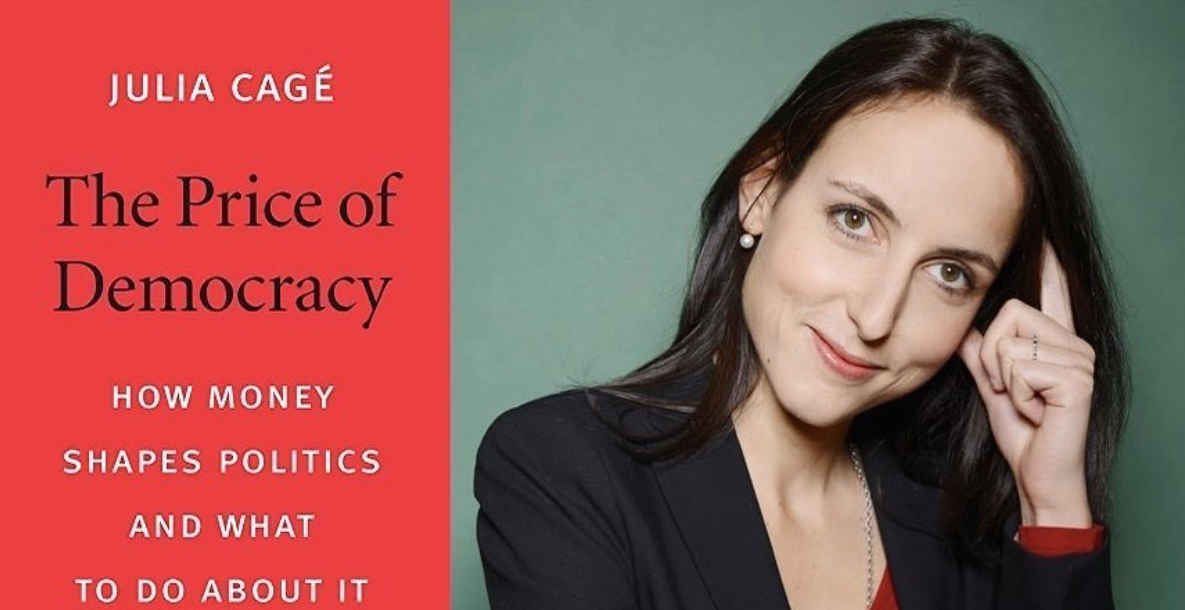The Price of Democracy: How Money Shapes Politics and What to Do about It
I am Associate Professor of Economics in the Department of Economics at Sciences Po Paris.
https://juliacage.com/
I am the recipient of a starting grant from the European Research Council (ERC) for a five-year project on “Campaign finance, Information and Influence: A Comprehensive Approach Using Individual-Level Data and Computer Sciences Tools” (PARTICIPATE) (legal information).
I am also co-director of the Laboratory for Interdisciplinary Evaluation of Public Policies (LIEPP)’s “Evaluation of Democracy” research group & a Research Fellow of the Center for Economic and Policy Research (CEPR) (Economic History, Industrial Organization, and Public Economics Programs).
I am the leader of the CEPR's Research and Policy Network on "Media Plurality”.
I ?received the 2023 Best Young French Economist Award.
English translation: A History of Political Conflict. Elections and Social Inequalities in France, 1789-2022. Harvard University Press, 2024.
Visit website
NEW “Corporate Donations and Political Rhetoric: Evidence from a National Ban” (with Caroline Le Pennec-Çaldichoury and Elisa Mougin)
Conditionally accepted, American Economic Journal: Economic Policy
NEW “Heroes and Villains: The Effects of Combat Heroism on Autocratic Values and Nazi Collaboration in France” (with Anna Dagorret, Saumitra Jha and Pauline Grosjean)
Conditionally accepted, American Economic Review.
NEW “Media Competition and News Diets” (with Charles Angelucci and Michael Sinkinson)
Conditionally accepted, American Economic Journal: Microeconomics.
NEW “The Heterogeneous Price of a Vote: Evidence from Multiparty Systems, 1993-2017” (with Yasmine Bekkouche and Edgard Dewitte)
Journal of Public Economics, 2022, 206.
NEW “It Takes Money to Make MPs: New Evidence from 150 Years of British Campaign Spending” (with Edgard Dewitte)
NEW “The Production of Information in an Online World” (with Nicolas Hervé and Marie-Luce Viaud)
Review of Economic Studies, 2020, 87(5): 2126-2164.
NEW “Media Competition, Information Provision and Political Participation: Evidence from French Local Newspapers and Elections, 1944-2014”
Journal of Public Economics, 2020, 85.
NEW “Newspapers in Times of Low Advertising Revenues” (with Charles Angelucci)
American Economic Journal: Microeconomics, 2019, 11(3): 319-364.
Event time is displayed in your time zone.
Julia Cagé, with a response by Alexander Hertel-Fernandez, moderated by Anya Schiffrin
One person, one vote. In theory, everyone in a democracy has equal power to decide elections. But it’s hardly news that, in reality, political outcomes are heavily determined by the logic of one dollar, one vote. We take the political power of money for granted. But does it have to be this way? And how does this equation play out in the current U.S. presidential election? In The Price of Democracy, Julia Cagé combines economic and historical analysis with political theory to show how profoundly our systems in North America and Europe, from think tanks and the media to election campaigns, are shaped by money. She proposes fundamental reforms to bring democracy back into line with its egalitarian promise. At a time of widespread political disenchantment, The Price of Democracy (Harvard University Press) is a bracing reminder of the problems we face and an inspirational guide to the potential for reform.
Julia Cagé is Assistant Professor of Economics in the Department of Economics at Sciences Po Paris. She is also co-director of the Laboratory for Interdisciplinary Evaluation of Public Policies’“Evaluation of Democracy” research group and a Research Affiliate of the Center for Economic and Policy Research.
Alexander Hertel-Fernandez is a political scientist who studies the political economy of the United States, with an emphasis on the politics of organized interests and public policy. The author of Politics at Work (Oxford UP), Hertel-Fernandez has examined strategies that businesses use to lobby across the states, and ways that wealthy individuals intervene in politics.
Anya Schiffrin is the director of the Technology, Media, and Communications specialization at Columbia University’s School of International and Public Affairs. She recently received her PhD from the University of Navarra. She is the editor of Global Muckraking: 100 years of Investigative Journalism from Around the World (New Press, 2014) and African Muckraking: 75 years of investigative reporting from Africa (Jakana 2016).
Event co-sponsored by the Columbia Maison Française, Alliance Program, Department of Economics, SIPA and Columbia Global Centers / Paris.
